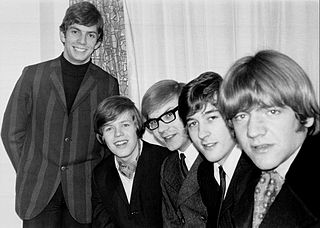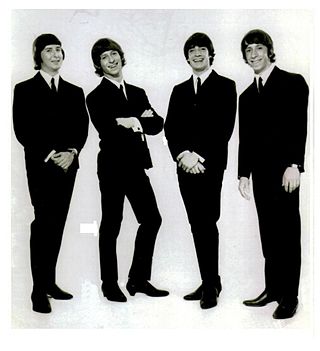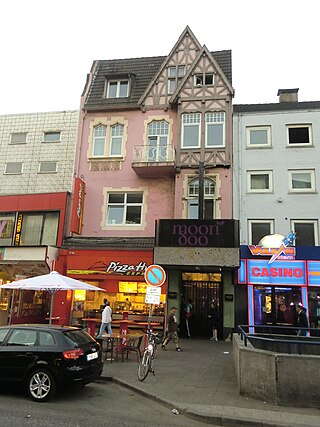Related Research Articles

Gerry and the Pacemakers were a British beat group prominent in the 1960s Merseybeat scene. In common with the Beatles, they came from Liverpool, were managed by Brian Epstein, and were recorded by George Martin. Their early successes alongside the Beatles were instrumental in popularizing the Merseybeat sound and launching the wider British beat boom of the mid-1960s.

Herman's Hermits are an English rock and pop group formed in 1963 in Manchester and fronted by singer Peter Noone. Known for their jaunty beat sound and Noone's often tongue-in-cheek vocal style, the Hermits charted with numerous transatlantic hits in the UK and in America, where they ranked as one of the most successful acts in the Beatles-led British Invasion. Between March and August 1965 in the United States, the group logged twenty-four consecutive weeks in the Top Ten of Billboard's Hot 100 with five singles, including the two number ones "Mrs. Brown You've Got a Lovely Daughter" and "I'm Henry VIII, I Am".
William Ellis Kinsley is an English musician, who was lead vocalist and bassist with The Merseybeats until 1966. The group disbanded in January 1966 to resurface as a duo called The Merseys. They recorded The McCoys' song "Sorrow" with the band before embarking on a solo career, where he recorded "Bye Bye Baby", a typical Merseybeat tune, followed by the singles "Annabella", and "You Make My Day".
Beat music, British beat, or Merseybeat is a British popular music genre that developed, particularly in and around Liverpool, in the late 1950s and early 1960s. The genre melded influences from British and American rock and roll, rhythm and blues, skiffle, traditional pop and music hall. It rose to mainstream popularity in the UK and Europe by 1963 before spreading to North America in 1964 with the British Invasion. The beat style had a significant impact on popular music and youth culture, from 1960s movements such as garage rock, folk rock and psychedelic music.
The Tornados were an English instrumental rock group of the 1960s that acted as backing group for many of record producer Joe Meek's productions and also for singer Billy Fury. They enjoyed several chart hits in their own right, including the UK and US no. 1 "Telstar", the first US no. 1 single by a British group.

The Remo Four were a 1950s–1960s rock band from Liverpool, England. They were contemporaries of The Beatles, and later had the same manager, Brian Epstein. Its members were Colin Manley, Phil Rogers, Don Andrew, and Roy Dyke (drums). Andrew and Manley were in the same class at school as Paul McCartney.

Los Shakers were a popular rock band in the 1960s and was a part of the Uruguayan Invasion in Latin America. They were heavily influenced by the look and sound of The Beatles. In the late 1960s they would broaden and expand their musical direction before breaking up in 1969.
The Dakotas are a group of British musicians, which initially convened as a backing band in Manchester, England. Their original vocalist was Pete McLaine who Brian Epstein replaced with the singer Billy J. Kramer, a Liverpudlian who was the lead vocalist for the group during the 1960s. In the U.S., they are regarded as part of the British Invasion.
The Undertakers are a British beat group, contemporaries of the Beatles and a leading group in the Merseybeat music scene of the early 1960s.

The Escorts were a Merseybeat band formed in October 1962 in Liverpool, England, by three classmates who had just left the Morrison School for Boys in Rose Lane, Allerton — Mike Gregory, Terry Sylvester and John Kinrade. In 1963, they were voted the ninth most popular group in Liverpool by readers of Mersey Beat magazine from a competitive field of several dozen popular Liverpool bands of the time.
"Wishin' and Hopin'" is a song, written by Hal David and Burt Bacharach, which was a US Top 10 hit for Dusty Springfield in 1964.
The Big Three were a Merseybeat group from Liverpool. They are best known for their 1963 recording of "Some Other Guy" and their close connection to The Beatles.

The Top Ten Club was a music club in Hamburg's St. Pauli district at Reeperbahn 136, which opened on 31 October 1960 and kept its name until 1994.
John Frederick "Johnny" Gustafson was an English bass guitar player and singer, who had a lengthy recording and live performance career. During his career, he was a member of the bands The Big Three, The Merseybeats, Quatermass, Roxy Music, The Pirates and Ian Gillan Band.

The Echoes were an English musical group, established in London in early 1960 by singer Chris Wayne, for the Johnny Preston, Conway Twitty and Freddy Cannon tour of Great Britain. During the period 1960 to 1971, the Echoes toured extensively throughout the United Kingdom and elsewhere in the world, playing for various artists and providing the backing on many recordings.
The Koobas were an English beat group from Liverpool. Their music, and their early history, is similar in some ways to that of fellow Liverpudlians The Beatles, though they never achieved widespread popularity.

Derry and the Seniors were a British rock and roll group of the early 1960s. They were the first band from Liverpool to play the club scene in Germany, paving the way for The Beatles and others. As Howie Casey and the Seniors, they were also the first Liverpool group to record an LP, and featured singer Freddie Fowell, later known as Freddie Starr.
The Dennisons were an English Merseybeat band, that emerged from the Liverpool scene in the early 1960s. Despite their background, and a couple of minor hit singles, they failed to achieve more than a local following and were unable to find a footing on the British Invasion. However, in 1963, Bob Wooler stated that "The Dennisons have created the biggest impact in Liverpool since the Beatles." The band's drummer, Clive Hornby, later became the actor best known for portraying Jack Sugden in British soap opera Emmerdale.
Anthony "Tony" Crane MBE is an English musician, who is best known as the co-founder of the Merseybeats. Tony has toured with the Merseybeats since its inception in 1961.
Faron's Flamingos were an English Merseybeat band. Despite their lack of commercial success, they remain an important part of Merseybeat history and have the distinction of being the first major example of the "Mersey Motown" sound with their release of "Do You Love Me".
References
- 1 2 3 4 5 6 7 8 9 10 11 "Biography by Bruce Eder and Richie Unterberger". Allmusic.com. Retrieved 25 October 2009.
- ↑ Pingitore, Silvia (28 September 2021). "Interview with The Merseybeats' Tony Crane - The Shortlisted Magazine". the-shortlisted.co.uk. Retrieved 21 October 2021.
- 1 2 3 Colin Larkin, ed. (1997). The Virgin Encyclopedia of Popular Music (Concise ed.). Virgin Books. p. 837. ISBN 1-85227-745-9.
- ↑ Lewisohn 2013, Thirty-One: Some Other Guy.
- ↑ "The Wild Men of Rock". BBC World Service. 22 July 2015. Retrieved 20 May 2021.
- ↑ Roberts, David (2006). British Hit Singles & Albums (19th ed.). London: Guinness World Records Limited. p. 361. ISBN 1-904994-10-5.
- Lewisohn, Mark (2013). The Beatles: All These Years: Volume I: Tune In. Crown Archetype. ISBN 978-1-4000-8305-3.